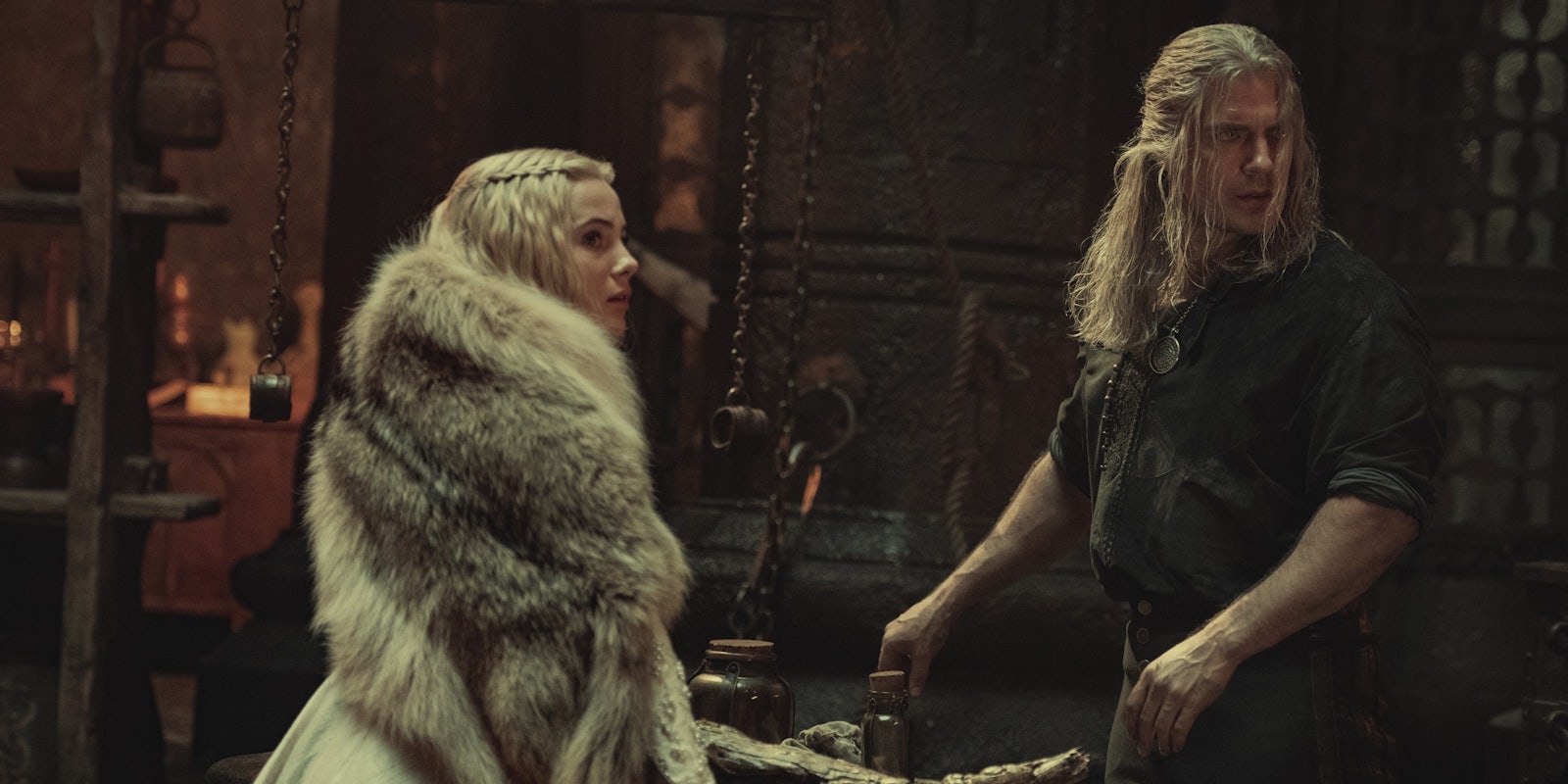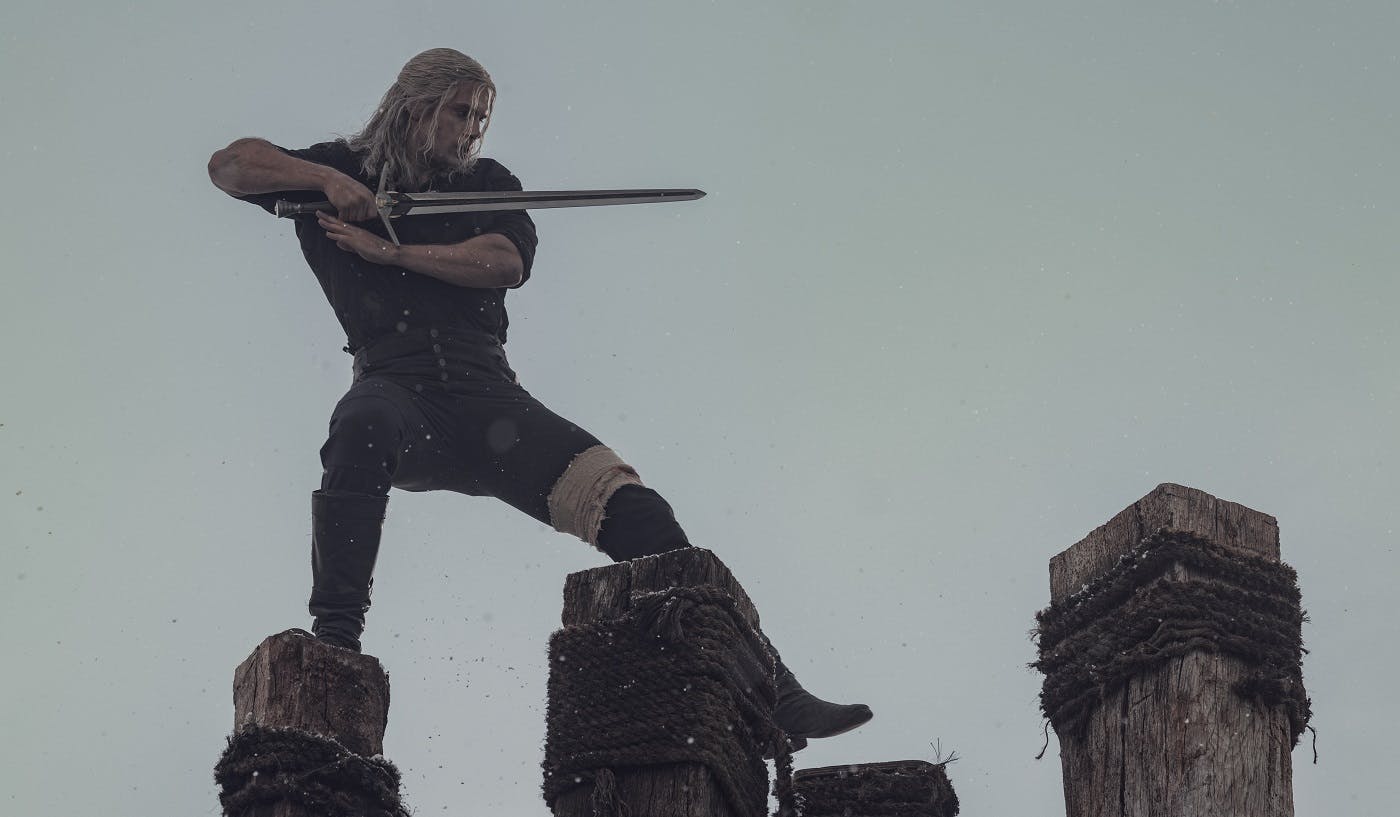This review contains no major spoilers for The Witcher season 2.
Dispensing with the byzantine non-chronological structure of season 1, The Witcher returns with two concurrent storylines: the titular witcher Geralt (Henry Cavill) bonding with his new protégé Cirilla (Freya Allan), and the maverick sorceress Yennefer (Anya Chalotra) struggling with the loss of her powers. Across the continent, a geopolitical conflict is brewing among various human kingdoms, the Council of Mages, and a refugee community of oppressed elves.
CREATOR: Lauren Schmidt Hissrich
STREAMING: Netflix
Netflix’s hit fantasy series finds its feet in season 2, focusing on the witcher Geralt (Henry Cavill) training his teenage ward Cirilla (Freya Allan). Embracing familiar fantasy archetypes, the show thrives on simple adventure setpieces… but struggles with serious big-picture storytelling.
The Geralt/Ciri arc is the clear winner at first, because The Witcher is fundamentally better at straightforward adventure storytelling. We don’t come to this show for its compelling international diplomacy. Fortunately, the political elements do become more interesting, with the rise of Nilfgaard as also an enticing tease for future episodes.
Back in 2019, I was in the rare and unpopular position of disliking this show. In addition to being overcomplicated and shallowly written, season 1 was hampered by a sexist origin story for its female lead (Yennefer sacrificed her fertility in a nude torture scene, to “cure” her disability) and a wooden leading man. With the exception of Geralt’s sidekick Jaskier, I found The Witcher largely humorless and lacking in personality.
With that in mind: Season 2 is a big step up! Production values are higher, particularly in terms of set design and practical effects for the monsters. We also benefit from a simpler narrative structure, adapted from the Witcher novels Blood of Elves and Time of Contempt. Geralt and Ciri spend several episodes in the witcher fortress of Kaer Morhen, introducing us to Geralt’s brethren and giving Ciri a chance to mature.
Cavill still delivers a rather one-note performance, but that clearly didn’t harm his popularity before. He’s widely seen as “perfect” casting for Geralt, a concept I can understand on paper, if not in practice. Along with being an action star who can convincingly slam a sword through someone’s cranium, Cavill is famously obsessed with Witcher lore, overlapping with his heavily-publicized celebrity persona as an unexpected nerd. His dramatic talents, however, leave something to be desired.
Geralt is a classic taciturn hero in the same mold as Wolverine or the Mandalorian—complete with a fatherhood arc. His relationship with Ciri is an obvious highlight, but elsewhere Cavill fails to live up to Geralt’s potential. It’s a deceptively tricky role. Witchers are lonesome, dangerous outcasts, and their emotions are supposedly dulled by the same process that gave them superpowers. Of course, we know that still waters run deep. Geralt is just repressed, highlighted by his prickly relationship with the effete bard Jaskier (Joey Batey) last season. But Cavill offers nothing beyond what he’s given in the script. Always speaking in the same husky growl, his expressions are limited to anger, exasperation, and a vague approximation of suppressed misery. Viewers must do the emotional work themselves, extrapolating what he’s presumably feeling beneath the surface.
Two years on from season 1, you may need to refresh your memory of The Witcher’s extensive secondary cast. Alongside recurring figures like Triss, Fringilla, Istredd, and the menacing Nilfgaardian commander Cahir, season 2 introduces a bevy of new characters rooted in settings like Kaer Morhen and Redania. Longtime fans will recognize Geralt’s fellow witchers like Lambert and Eskel, and their mentor Vesemir (Kim Bodnia). Meanwhile, Jaskier, a big hit in season 1, has a surprisingly small role in the six episodes made available for review. He gets another banger of a song, but surprisingly little screentime overall.
Netflix’s biggest hits often thrive on being easy to watch. This includes The Witcher, whose main character arcs are pleasingly digestible, driven by magical quests and relatable desires. You’re unlikely to hit pause because the show is too intellectual or emotionally challenging. And when things do get heavy, the writers invariably pivot to a different subplot where someone is quaffing ale in a tavern, or lopping the head off a wyvern. Simple pleasures.
As I warmed to season 2, I grew to appreciate The Witcher’s Ren Faire side. Moments like a sorceress doing lab tests (!) using faux-medieval centrifuge, or Ciri performing a training montage on an obstacle course. This is what the show should be focusing on. The writing isn’t sophisticated enough to support dozens of elvish dissidents, conniving mages and traveling warriors. I suspect that even die-hard Witcher fans would agree. And if you are one of those fans, you’re sure to be happy with season 2. Balancing grittiness with a sincere affection for the fantasy genre, this show has come into its own.


